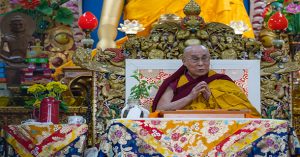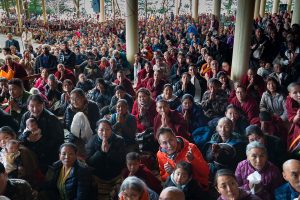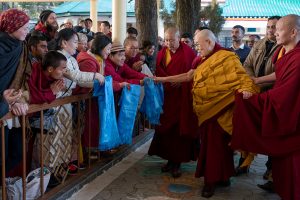
Photo: dalailama.com
Tsuglagkhang, the main Tibetan temple in McLeod Ganj, and its surrounding verandas, as well as the courtyard below, were filled with people on the morning of March 13, waiting for His Holiness the Dalai Lama to arrive.
The teachings continued for three days. On the first day his Holiness set the scene, explaining that 2,600 years ago in India there were many other religious and philosophical traditions.They were all beneficial to their followers in their way, and many continue to be so.
He remarked that this is illustrated in paintings of the Wheel of Life, in the outer rim are depictions of the twelve links of dependent arising, which begin with ignorance.
On the second day of the teaching, his Holiness remarked on the difficulties of preserving traditions in Tibet in recent years, particularly in the great monasteries of central Tibet, but it has not been so tough in Kham and Amdo.

Photo: dalailama.com
He mentioned that the first text he was going to read, from Kamalashila’s three part Stages of Meditation, had been written in Tibet at the request of TrisongDetsen, then a man of great influence who exercised authority over the whole of Tibet. His Holiness said he feels this work has a special connection with Tibetans. He said that the first volume of the Stages of Meditation dealt with single-pointed concentration, the second and middle volume dealt with both concentration and special insight, while the third focused on special insight.
Brief prayers were recited and His Holiness advised that everyone, teachers and students should, correct their motivation in relation to the teaching.
On the final day, he gave a teaching on the empowerment of Avalokiteshvara. He said, “Avalokiteshvara is praised by all the Buddhas. He is the embodiment of the compassion of all the Victorious Ones. As Chandrakirti wrote in his Entering into the Middle Way, compassion is important at the beginning, middle and end of the path. Buddhas and Bodhisattvas have great qualities of body, speech and mind based on minds that are rooted in compassion. To begin with all the Buddhas generated the awakening mind of bodhichitta based on their having a courageous heart of compassion. By serving others they fulfil their own purposes—because they have compassion.”

His Holiness greeting the members of audience on his way to temple
Photo: dalailama.com
His Holiness, on a lighter note, told devotees that whether they take the vows or not, killing, stealing and other offenses would definitely lead them to trouble. “For lay people abstaining from drinking may be hard. So my advice is that you drink but to a limit and not till you are totally intoxicated” he advised.




 Print
Print Email
Email